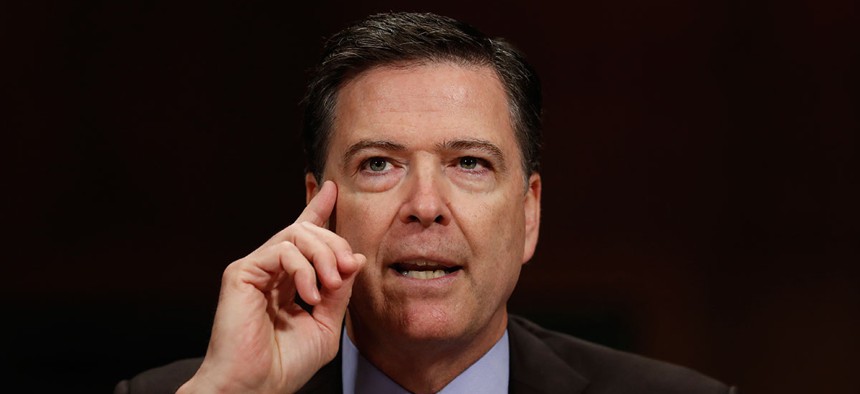FBI Director Has No Regrets About His Fateful 2016 Decision
Testifying before the Senate, James Comey said he did not regret his late October announcement that the investigation into Hillary Clinton had been reopened.
FBI Director James Comey has no regrets about the agency’s handling of the investigation into former Secretary of State Hillary Clinton’s private email server just days before the presidential election.
“It was a hard choice, I still believe in retrospect the right choice, as painful as it’s been,” Comey told the Senate Judiciary committee, adding that the thought that he had affected the 2016 election made him “mildly nauseous.”
Comey was back on Capitol Hill Wednesday morning to testify in what was billed as a routine congressional oversight hearing, but minutes into the hearing, the director was questioned about his letter on October 28 notifying lawmakers that more emails had been uncovered that were pertinent to the investigation into Clinton’s private email server that she maintained while secretary of state. Political analysts and Clinton herself have blamed Comey’s letter and subsequent news coverage of the event for her defeat in the 2016 presidential election. In March, Comey revealed for the first time that the Trump campaign had been under investigation related to its ties to the Russian government, since the summer of 2016.
Senator Dianne Feinstein, the committee’s ranking member, introduced the matter in her opening remarks and proceeded to ask the director about his actions. Feinstein flatly asked Comey: “Why was it necessary to announce 11 days before a presidential election that you were opening an investigation on a new computer without any knowledge of what was in that computer? Why didn't you just do the investigation as you would normally with no public announcement?”
Comey defended the agency’s actions, saying that classified emails from Clinton to her aide Huma Abedin that had been forwarded to Abedin’s husband, former congressman Anthony Weiner, might have contained “evidence [Clinton] was acting with bad intent,” and so Comey felt obligated to inform Congress.
Feinstein interrupted Comey in the middle of his explanation saying, “but they weren’t there.”
Comey proceeded to lay out the reasons behind his decision: “I sat there that morning and I could not see a door labeled no action here. I could see two doors and they were both actions—one was labeled speak, the other was labeled conceal.”
He added: “Speak would be really bad. There's an election in 11 days, lordy that would be really bad. Concealing in my view would be catastrophic. Not just to the FBI, but well beyond. And honestly, as between really bad and catastrophic, I said to my team we've got to walk into the world of really bad.” Earlier in the hearing, Comey made a point of saying that he had not made a public announcement on Clinton’s private email server. But he later conceded that he knew the letter would be leaked. “I know how Congress works.”
Republicans and Democrats have both criticized Comey for his actions within the last year. In tweets on Wednesday morning before the hearing, President Trump described Comey as “the best thing that ever happened to Hillary Clinton in that he gave her a free pass for many bad deeds!”
Senator Ben Sasse asked Comey about WikiLeaks, the group that published thousands of hacked emails from Democratic officials during the 2016 election, another factor Clinton has cited as a reason for her defeat. Sasse asked Comey whether WikiLeaks qualified as a journalistic organization.
“To my mind, it crosses a line when it moves from being ability trying to educate a public and becoming about information porn without methods in regard to interest without regard to the First Amendment values that normally underlie press reporting and simply becomes a conduit for the Russian intelligence services and adversaries to push out information to damage the United States,” Comey said.
The FBI director drew a line between WikiLeaks and American journalists, who will notify the agency before publishing classified information, noting that WikiLeaks will “push it out in order to damage.”
In his opening remarks, Chairman Chuck Grassley blasted the agency, and notably, the agency’s handling of a dossier written by a former British intelligence officer published by BuzzFeed News in January, which accused Trump of close ties to the Russian government. The dossier contained a number of damaging, but ultimately unsubstantiated allegations about the president.
“The public needs to know what role the dossier has played and where it came from and we need to know whether there was anything improper going on between the Trump campaign and the Russians. Or are these more allegations just a partisan smear campaign that manipulated our government into chasing a conspiracy theory,” Grassley said.
Questions about the ongoing investigation into the Trump campaign and Russian interference with the 2016 election resurfaced on Wednesday, though Comey said he would not discuss it until it was finished.
“I would expect we're not going to say another peep about it until we're done, and I don't know what will be said when we're done, but that's the way we handled the Clinton investigation as well,” he said.
Senator Lindsey Graham later asked Comey about a separate issue raised earlier this year regarding the unmasking of individuals in intelligence reports. Graham asked whether the agency has required the unmasking of an American citizen caught up in incidental collection. “Yes,” Comey said, adding later that he was not aware of any requests by the White Houses to unmask American citizens in 2015 or 2016.
Graham’s line of questioning stems from reports that former National Security Advisor Susan Rice asked for the identities of Trump transition team officials in intelligence reports to be revealed. Rice told MSNBC’s Andrea Mitchell in April that requesting the names of people swept up in intelligence surveillance is not unusual and that allegations that she would so for political purposes was “absolutely false.” Comey noted that the national security adviser is among a small group of people who can request such information.




